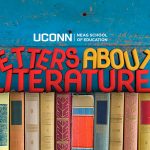Stephen T. Slota, assistant professor in residence of educational technology, shares eight quick tips for K-12 and higher educators in the process of transforming face-to-face instruction into online instruction.
“This is one more vivid example of how the playing field is not level,” said Richard Schwab, a professor in educational leadership at UConn’s Neag School of Education and the former dean of the school. “Zip code is determining your education, not only in schools but online and I don’t think this is going away.”
Dr. Devin Kearns, an associate professor of special education in the Neag School of Education at the University of Connecticut, is studying different forms of dyslexia intervention for students using technology.
Schools haven’t been unprepared for this moment, said Michael F. Young, an associate professor of educational technology at the University of Connecticut’s Neag School of Education. But the immediate strain of wholesale migration to digital learning technologies will be felt by districts, he said.
Can everyday creativity be a small silver lining during the outbreak?
“The new provost will play a crucial role in developing, implementing and evaluating a new academic plan,” Chafouleas told The Daily Campus when the search began. “Thus, it is important that the committee find a strong academic leader who brings capacity to take multiple perspectives on important issues when selecting paths forward.”
In this episode, we speak with Dr. Jennie Weiner Ph.D., professor of Education Leadership at UConn’s Neag School of Education. Dr. Weiner raised quite a few eyebrows earlier on during this COVID-19 pandemic when she Tweeted about how she had no intention of homeschooling her kids while sheltering-at-home, and was going to allow them to enjoy their video games, eat cookies, and play instead. Her Tweet quickly went viral, and she was invited to write an op-ed piece in the New York Times to discuss her philosophy and motivations behind taking this approach.
The Neag School of Education, UConn’s Department of English, and the Connecticut Writing Project (CWP) at UConn are proud to announce Connecticut’s winners of the 26th annual Letters About Literature competition, a nationwide contest sponsored by the Library of Congress for students in grades 4 through 12.
With her three kids — ages 19, 17 and 14 — home for the foreseeable future, Chafouleas and her husband were left, like so many Connecticut parents, to adjust to a new normal of balancing home-schooling and telecommuting.
“The first class I was teaching in English to American kids I was a bit nervous at times,” Wang said. “Taking this initiative [to talk to people] first, you will actively solve your problem. Second, you will take this challenge as an exercise for you to establish good communication ability and interact with people in the host country.”


